Every month, we pick a few topics for exploration. The topics we select aren’t meant to cover every issue area facing the progressive community, but rather to give actionable advice on how to talk about key issue areas. This month we focused on:
How can progressives frame the economic debate on their own terms?
All conservatives want to talk about is capitalism and socialism, but in doing so, they expose one of their greatest weaknesses – support for an economic system that puts the wealthy ahead of regular people.
How are the views of the Mueller Report evolving as Americans learn more?
Despite the president’s claims of “total exoneration,” most Americans believe the Mueller Report revealed wrongdoing, but Americans are divided on the extent and seriousness of the misdeeds.
How can progressives make the case for getting Trump’s tax returns?
Americans want Congress to obtain Trump’s tax returns, and those backing the push can argue it’s in the public interest: the country should be able to find out who the president really is, and where he gets his money.
1 | Framing the Economic Debate
Focusing the conversation on who benefits from the economy today exposes conservative weaknesses.
In March, Navigator outlined several arguments that effectively counter conservative scaremongering about socialism by engaging with the arguments head-on. But progressives should not feel the need to defend socialism or defend a broken status quo, and instead they can highlight where conservatives have a deep weakness: they support an economic system that makes the rich and powerful even richer and more powerful but fails regular people. This month, Navigator examines arguments that remind the public of the rules governing the economic system and how they promote the public interest.
For now, Americans believe the economy in general is doing well.
Navigator’s tracking finds the share of Americans who rate the U.S. economy as good or excellent at 63%, and the share with a negative rating at just 32%. These ratings for the economy bolster perceptions of President Trump’s handling of the economy, for which he earns 48% approval, seven points higher than his overall job approval (41%).
Giving the economy positive ratings overall, however, is not the same as believing the economic status quo works for you and your family. In a forced choice, Americans are more likely to agree with “right now it’s just wealthy people at the top getting richer, while people who work for a living are falling behind” (57%) than with a statement emphasizing just how well the economy is doing (43%). The majority of political independents (59%) and – importantly – 40% of Americans who give the economy a positive rating unite with nearly all Democrats (87%) preferring the more populist argument.
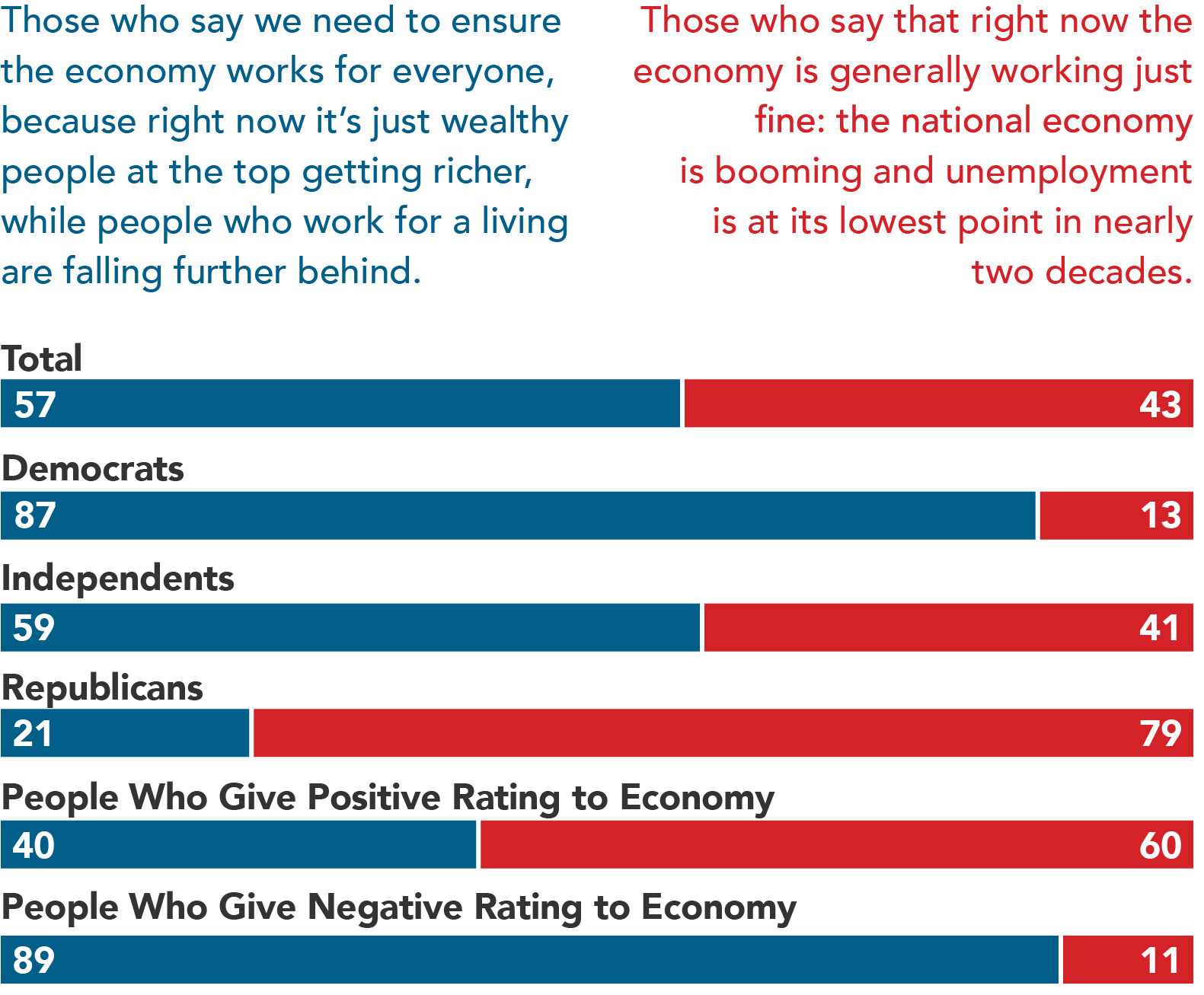
And if conservatives come back at progressives with their socialist vs. capitalist framing, the answer is the same – and works just as well. Navigator re-asked the same question as above, but inserted the conservative framing on socialism and capitalism and found the progressive argument to be just as effective despite it.
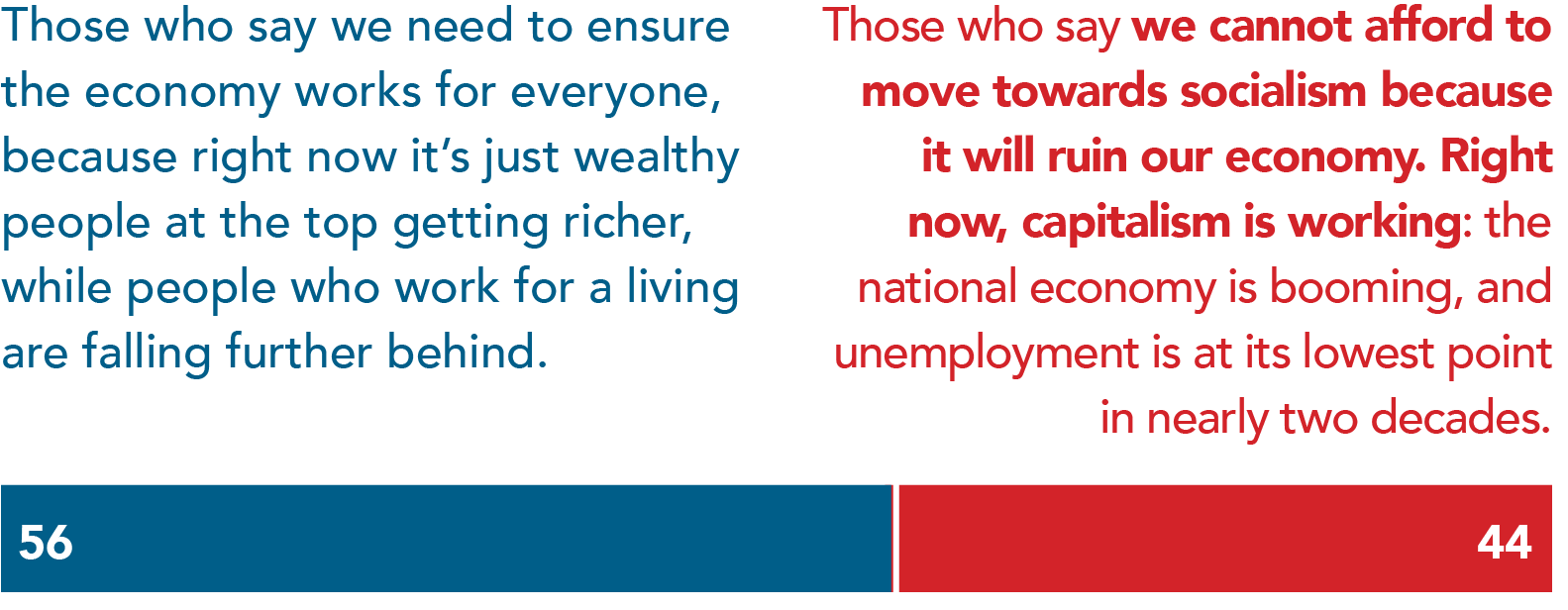
Simply moving the conversation from “the economy” to “workers” also has the potential to tip the scale further in favor of progressives. The emphasis needs to be not just the success of the economy, but who benefits from it.
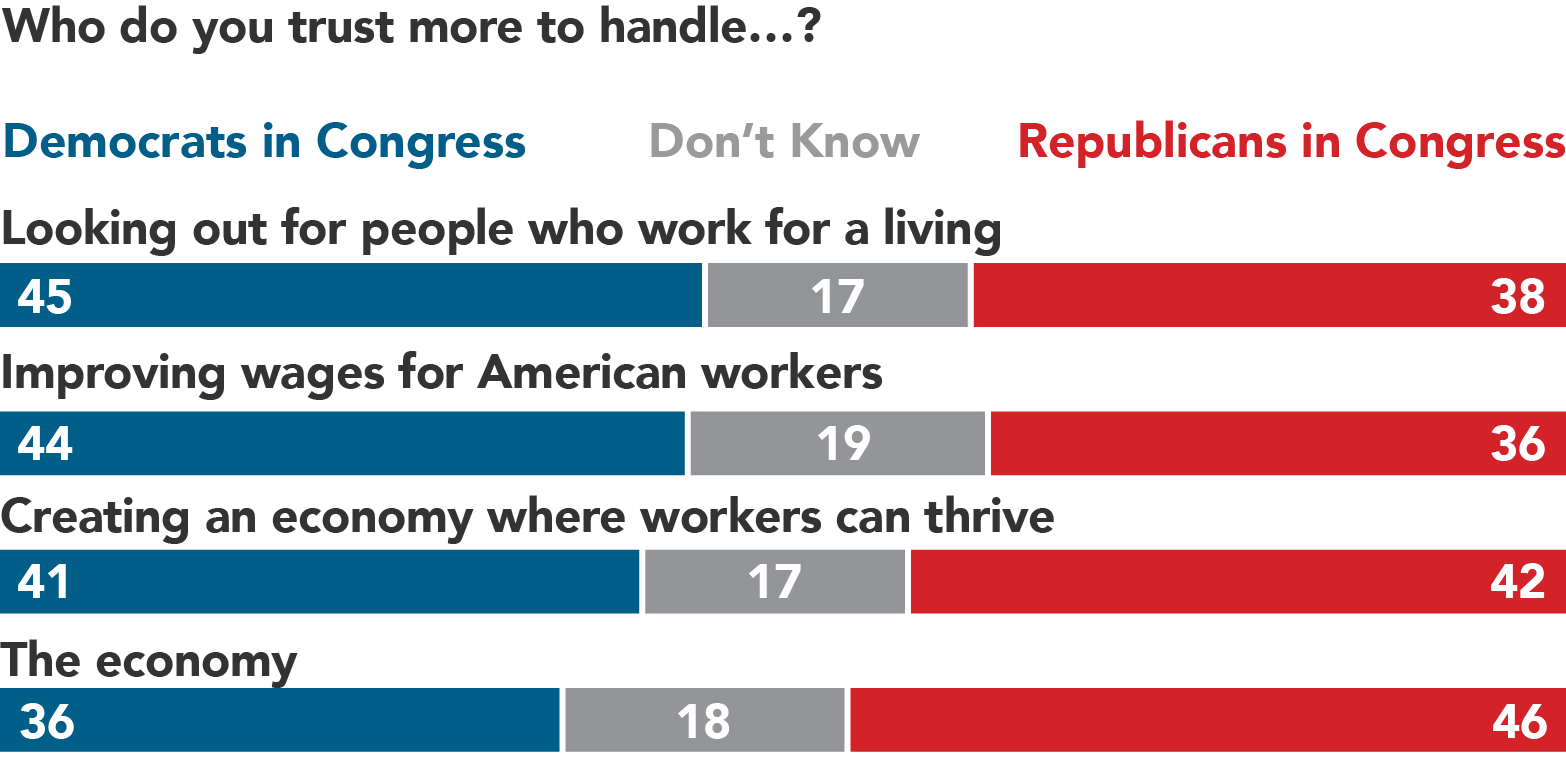
Embrace “rules” that put the public first – and contrast it with the alternative.
Americans like a free market in theory, but that doesn’t mean they want a free-for-all. Overall, 55% of the public say American capitalism is going very or somewhat well, while 29% say it is not going so well or well at all. Among those who give the economy a positive rating, approval of capitalism is much higher at 72%-17%.
But satisfaction with the economic situation in general does not translate to support for a completely unfettered free market. In fact, if it is a choice between a conservative version of capitalism “without rules” or “without regulations” and capitalism with rules and regulations, the public is almost entirely aligned with the progressive framing.
Don’t let conservatives own capitalism alone. Instead, make them own capitalism without rules, which the public has deep concerns about.
Forcing a choice between capitalism with rules or without them leads to an overwhelming response. While it may not be immediately credible for all Americans that conservative policy-makers want capitalism “without rules,” this is a powerful place to start the conversation and reminds people what’s wrong with the conservative approach.

A system that serves the many vs. a system that serves the few.
For progressives who would rather not be mired in the debate over socialism vs. capitalism, there is an alternative frame: remind Americans that what it’s really about is a choice between an economy with rules and an economy without them. And if conservatives protest that regulations will burden businesses, progressives have an opening to again put themselves on the side of regular Americans – by speaking to more serious worries about a system with no rules at all, or guided by rules that put corporate interests first.

Frame economic rules and regulations as a check on the most wealthy and powerful in society.
“Rules” can mean many things in the economic system, and they can potentially serve as the solution to some very different problems, from corporate monopolies to corporate pollution. Navigator tested six different frames.
There was one clear, winning argument: that we need rules – the right rules – to have an economy that works for every American, not just those with power and wealth.
There are two other messages that are slightly above-average in impact: one arguing that rules are important so profits don’t drive up the cost of things Americans “need to survive and succeed” such as health care; the other arguing that without rules, we get harmful monopolies.
MaxDiff Methodology
To find the top-performing message, Navigator used a methodology called “MaxDiff.” This approach is used in market research to understand consumer preferences when there is a list of items to consider. Instead of rating all items at once, respondents are presented with separate assortments of three to four messages and asked to choose the most and least convincing one. One benefit of the approach is that it allows researchers to differentiate between a large number of statements, even when they might receive similar scores if rated one-by-one. In the graphic at right, scores have also been indexed such that those above 100 points are above average. Importantly, the scores do not reflect how convincing each statement is in and of itself, but rather how convincing it is relative to the other statements tested in this exercise.
Navigator also tested some of the specific items that progressive communicators can cite when making a case against the status quo.
Among the most effective: rising health care costs, major corporations paying zero dollars in taxes, and the de-regulation of corporate polluters.
Notably, even among Americans who say the economy overall is in good condition – and among people who approve of Trump – many believe these points raise “fundamental doubts” about the economic system.
MaxDiff Analysis: The most (and least) convincing arguments for an economic system with rules.
Progressives are in a strong position to argue the economy may be doing well overall, but if conservatives have their way, the wealthy and powerful will manipulate the system so benefits go to the top and stay there. What progressives want to do is keep power in check and give everyone the chance to succeed.
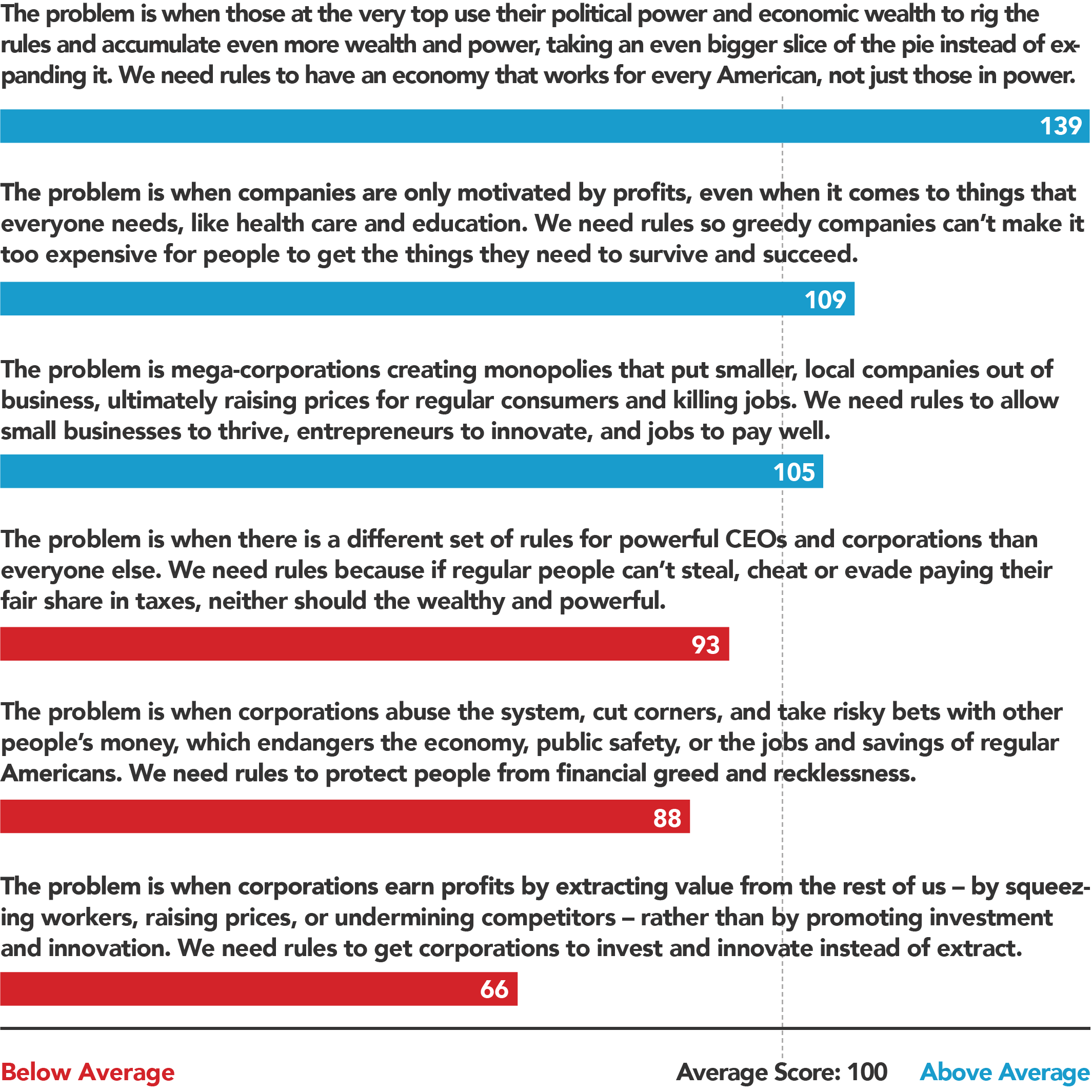
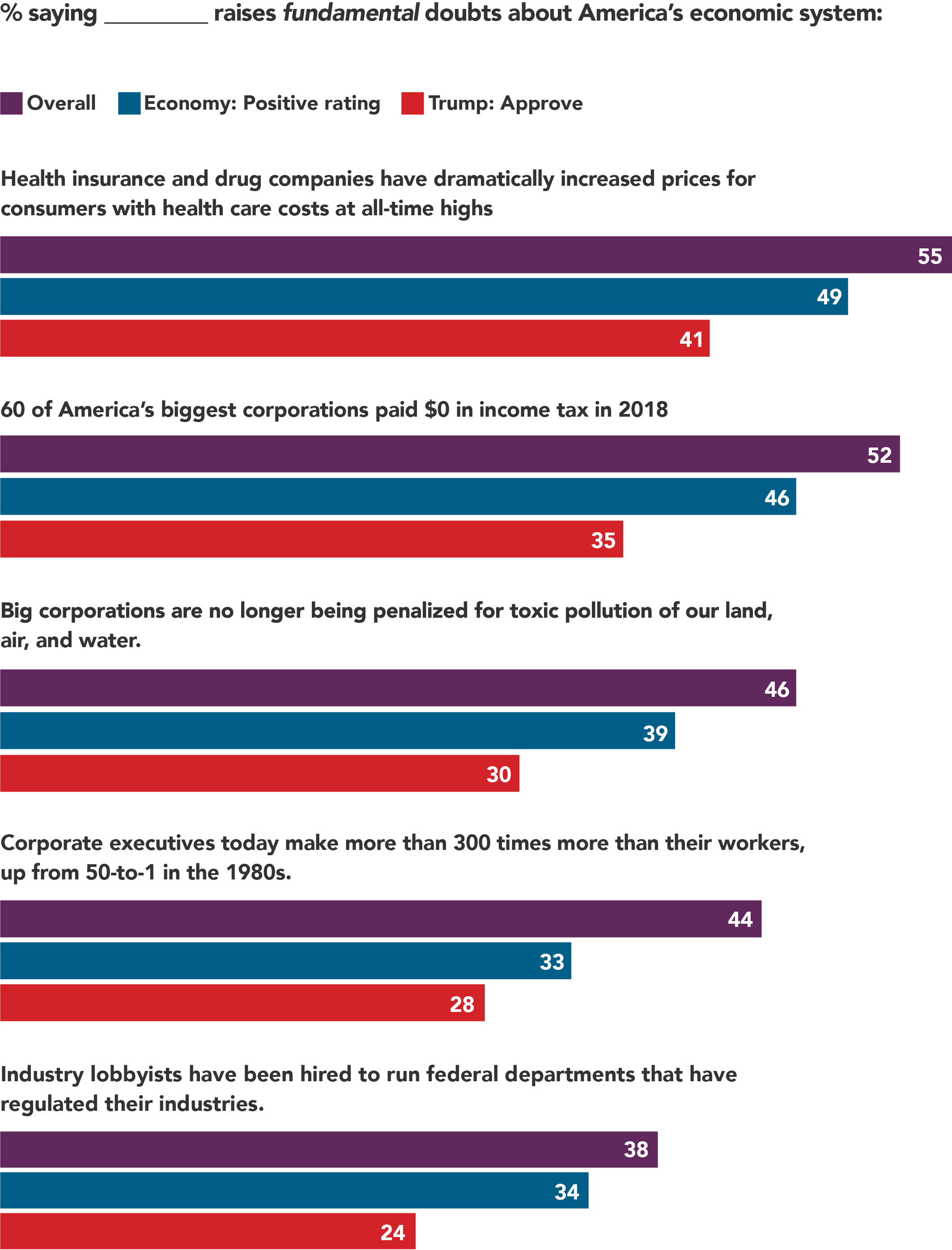
2 | Mueller Aftermath
The Mueller Report revealed wrongdoing, but Americans are divided on the extent and seriousness of Trump’s misdeeds.
In the weeks following the public release of the Mueller Report, one thing is clear: a majority (56%) believe the report revealed President Trump engaged in wrongdoing, while only 21% believe he was totally exonerated (another 23% don’t know). Even among Republicans, of whom 86% approve of the president’s job performance, just 44% believe that Trump was exonerated. And among Americans who have heard a lot or some about the report (72%), the percentage who believe Trump committed wrongdoing rises to 65%. This may inform the public’s strong inclination to side with Democrats in Congress on oversight and related issues:
- Americans trust congressional Democrats over President Trump by 13 points (46% to 33%) when it comes to “the rule of law” and by 9 points (42% to 33%) when it comes to “government transparency.”
- By 6-points (48% to 42%), Americans continue to be more concerned the Trump administration will get away with corruption and unethical behavior more so than Democrats going too far in oversight.
While most think Trump engaged in some wrongdoing, the public is somewhat divided on the extent and seriousness of it: 17% believe the report showed wrongdoing but conclusively did not show criminality, 29% believe the report was inconclusive on criminality, and 9% believe it recommended he should be charged with crimes.
Remind Americans what Mueller has already found.
Navigator looked at several potential frameworks progressives can use to defeat the conservative argument that the investigation was a political witch hunt wasting taxpayer money while exonerating Trump. Each progressive argument tested beats back conservative counters by six to 10 points, regardless of whether the focus of the argument is further investigating instances of potential obstruction outlined in the report, enumerating the ongoing investigations that started from the Special Counsel’s work, or emphasizing the number of illicit contacts between the Trump campaign and Russians. Even an argument calling for continued congressional investigation to determine whether acts rise to the level of initiating impeachment proceedings wins by a 55% to 45% margin, suggesting the mere mention of impeachment proceedings does not deter most Americans from saying it is necessary for Congress to continue their investigations.
When making the case for continued inquiry into matters identified by the Mueller Report, it is important for progressives to remind Americans that compelling evidence of obstruction has already been uncovered and needs further examination.
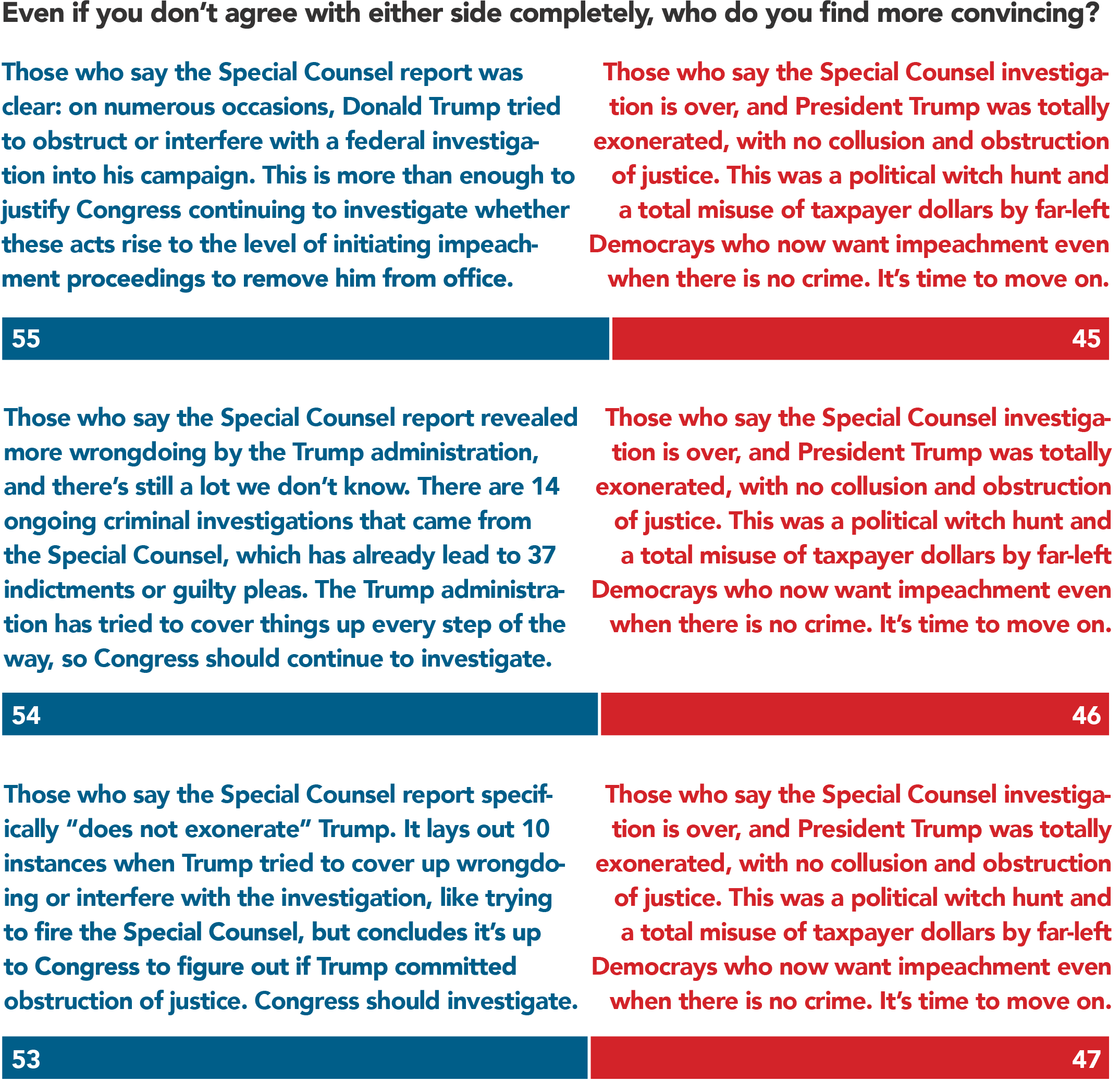
Americans don’t like William Barr.
It’s not just regarding the investigation itself that Americans side with progressives. The public has not responded well to Attorney General William Barr or his handling of the release of the report.
Barr has become better known and less popular. In just three months’ time, the percentage of Americans familiar with Barr has increased from 24% to 61%. Yet his unfavorability has increased significantly more (12% in February to 39% now) than has favorability (13% in February to 22% now).
- Only 31% approve of the way Barrhas handled the public release of the Mueller Report, compared to 44% who disapprove.
- Mueller’s version of events is more trusted than Barr’s by a 39% to 21% margin, expanding to a 47% to 16% margin when Barr is described as “Trump’s Attorney General.”
Given the Attorney General’s personal unpopularity, progressives may benefit from criticizing his handling of the release to bolster the argument in favor of continued investigations.
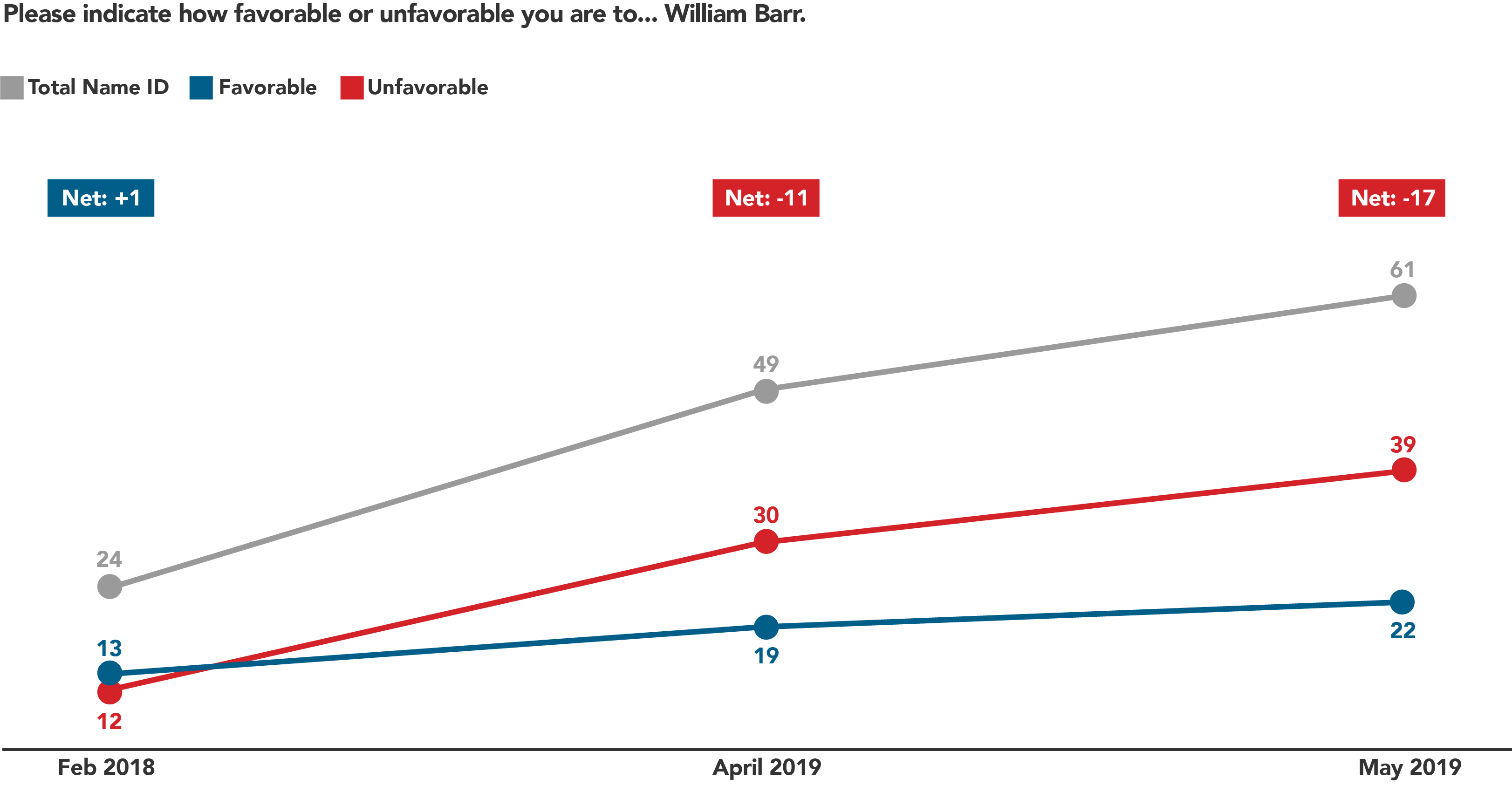
3 | Tax Returns
Americans’ biggest worry – and biggest suspicion – is that Trump is hiding financial wrongdoing.
Despite the president’s continued refusal, the public continues to support congressional action to obtain Trump’s tax returns. Overall, 58% support Congress’ efforts to obtain his returns while only 30% disapprove.
Notably, there is plenty of intensity in favor of Congress obtaining his returns, and not much intensity on the other side: 41% strongly support Congress obtaining them; only 17% strongly oppose.
The president has argued he cannot release his taxes because he is under audit, but Americans across the political spectrum believe it is more about Trump protecting personal interests that run counter to what’s best for the country.
Asked what Trump’s actual motivations are for withholding the returns, 63% expect his returns will reveal unflattering information about the president. Specifically, the public expects his returns will reveal he has committed tax fraud (39% place this in the top two), he has paid little to no taxes (27%), he has financial ties to Russia (17%), he is not as rich as he says he is (15%), or that he does not contribute much to charity (3%).
Only (21%) believe Trump’s audit explanation is among the top reasons for not releasing his returns. Even among Republicans, only 37% cite the audit in their top two suspected motivations.
Americans’ concerns about what is in Trump’s tax returns align with their theory on why he is concealing them, with the most concerning issues revolving around the potential of tax fraud or other crimes (37%) or the president having paid little to no taxes (30%).
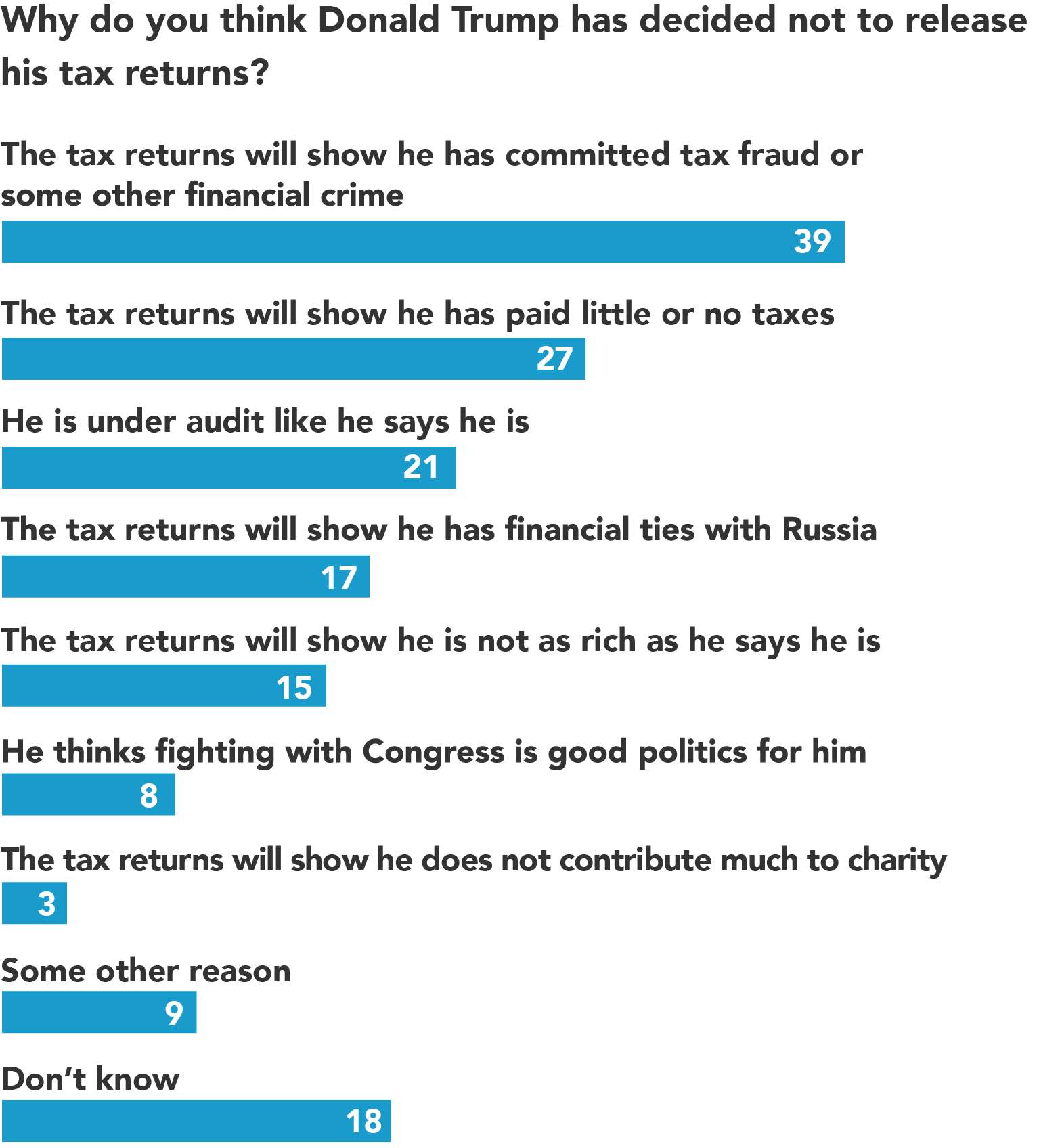
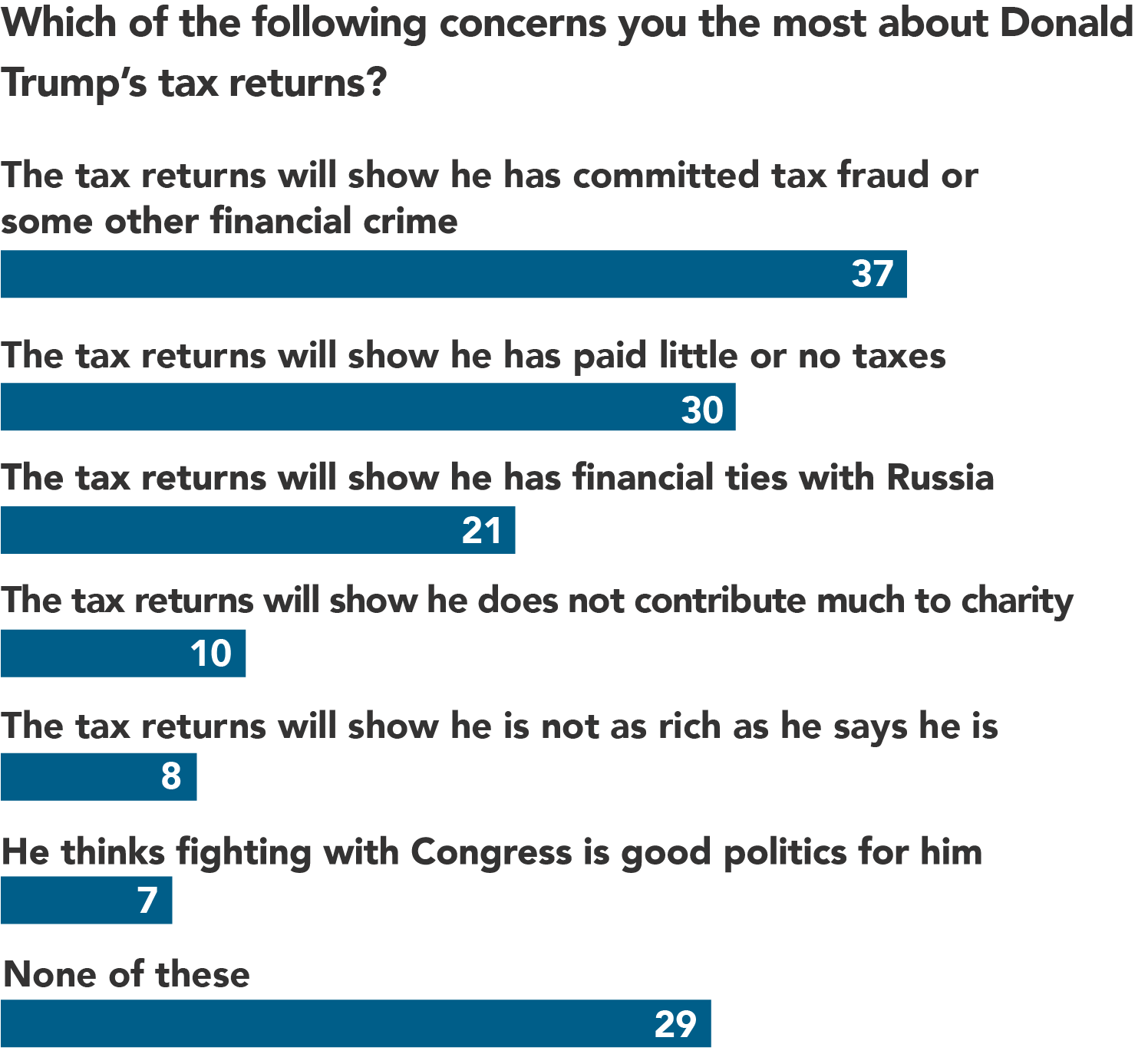
For the public, getting Trump’s tax returns is about knowing who the president really is, and where he gets his money.
Progressives are well-stocked with potential arguments to further this debate. The most important points of emphasis for advocates: always remind the public that revealing Trump’s tax returns is, first and foremost, about transparency that serves the public interest.
A progressive argument focusing on the public having “a right to know who pays the president” and “if the president has been honest about how successful he has been, how much he has contributed to charity, and whether he has avoided or even illegally evaded taxes” bests the conservative counter-argument by 20 points (60% to 40%; 68% to 32% among independents).
A similar argument focused on needing to know whether Trump has personally benefited from his policies bests the opposition’s counter-argument 59% to 41% (70% to 30% among independents).
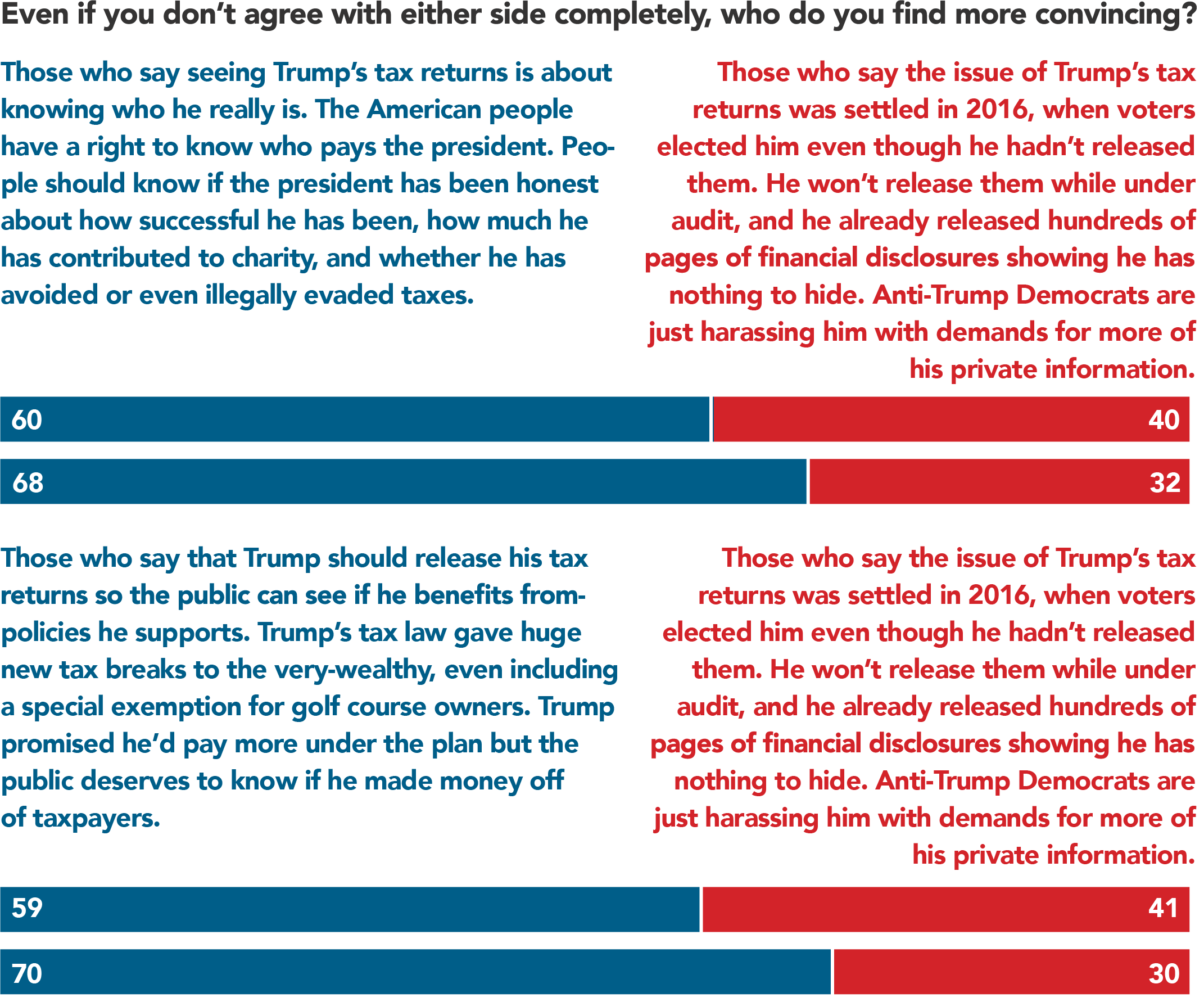
While progressives can win an argument about Trump’s tax returns on the national security implications of his ties to Russia and Saudi Arabia, the message invoking foreign interests is less effective overall (53% support the progressive argument versus 47% siding with Trump’s message; it also loses to the conservative argument among independents 44% to 56%).
A separate Navigator language test suggests progressives should leverage public distrust of Trump’s motivations when describing his decision to conceal his tax returns. Most Americans say they interpret Trump’s actions as “suspicious” (42%), a “cover up” (33%), or “secretive” (28%). At the same time, it would be premature to describe the president’s actions as “corrupt” (28% overall, but only 8% among non-Democrats) or “criminal” (15%).
The bigger picture: Donald Trump has a serious credibility issue with the public.
Previous research by Navigator and other public polling has shown most Americans are deeply skeptical of President Trump’s honesty as well as the motivations behind the lies. This is important context for this edition’s findings: when it comes to the Special Counsel’s investigative findings or Trump’s tax returns, most Americans are receptive to progressive arguments focusing on honesty, accountability, and transparency. Progressives are well- positioned to claim the mantle of protecting the public interest when engaging in these debates, and can contrast themselves with a president more interested in protecting himself.
Bonus Points
On the economy, a negative campaign is not enough
- It is important to challenge the status quo, but progressives should avoid a message that doesn’t also provide a positive alternative. A positive message – that starts by centering workers and regular people, and finishes by arguing rules are necessary to protect their interests – is rated more convincing than a conservative argument touting the free market, by a decisive 24-point margin.
- However, progressives risk forfeiting that advantage if their message is purely negative, attacking those who would “change the rules to protect the people and corporations who already have the most” without emphasizing what should be done to make the economy work or for whom it should work. Against the same conservative argument, this progressive message only ties, 50%-50%.

Trump: Not a typical Republican
- Donald Trump shocked many Americans when he dominated the Republican primary, and the latest Navigator survey shows that most still do not see him as a “typical Republican” – for better or worse.
- By a decisive 71% to 29% margin, people say Trump is “unlike other Republicans.” Democrats are much more likely to say he is “typical” (at 44%), while independents and Republicans overwhelmingly say he is not (by 80%-20% and 84%-16%, respectively).
- Perhaps underlining the complicated relationship between Trump and his party, those who strongly approve of him are far more likely to say he is “unlike other Republicans” (90%-10%). However, even his biggest detractors don’t fall clearly in the opposite camp: those who strongly disapprove of him are divided, 45% “typical” to 55% not.
Sarah Huckabee Sanders: Not popular
- White House Press Secretary Sarah Huckabee Sanders may not be in front of the cameras as regularly as she used to be after the administration stopped regular briefings, but she joins the ranks of Trump allies with an underwater personal rating.
- Overall 31% of Americans have a favorable opinion of Huckabee Sanders, while 42% have an unfavorable opinion. Unsurprisingly, opinion is polarized by party, with Democrats giving her a net rating of -53 (11% favorable, 64% unfavorable) and Republicans giving her a net rating of +40 (58% favorable, 18% unfavorable). But she is also rated -17 (22% favorable, 39% unfavorable) on net among independents, which tips the scales out of her favor.
About The Study
Global Strategy Group conducted a public opinion survey among a sample of 1,008 registered voters between May 2-6, 2019. 115 additional interviews were conducted among political independents with no partisan lean. The survey was conducted online, recruiting respondents from multiple opt-in online panel vendors. Respondents were verified against a voter file and special care was taken to ensure the demographic composition of our sample matched that of the national registered voter population across a variety of demographic variables.

